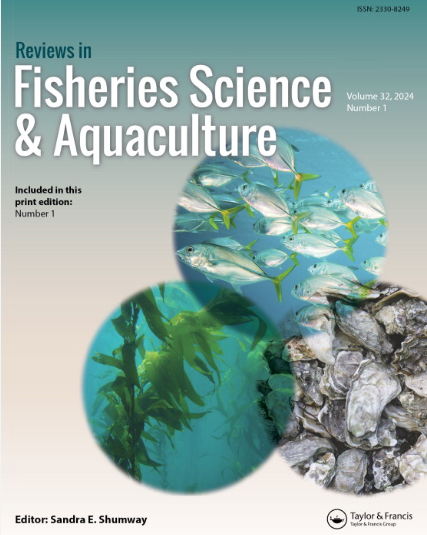在气候变化时代,水产养殖在Côte科特迪瓦(科特迪瓦)减少贫困和控制血吸虫病的潜力:系统综述
IF 5.3
1区 农林科学
Q1 FISHERIES
引用次数: 7
摘要
水管理基础设施的发展,如水坝和运河,是社会应对不断增长的人口和应对气候变化的重要组成部分。然而,土地利用的这些变化也可能增加水媒疾病的传播风险。血吸虫病是一种由贫穷引起的寄生虫病,全世界有超过2.4亿人受到感染,与人工水库相关的传播风险已得到广泛记录。其中90%以上的病例发生在撒哈拉以南非洲,该地区正因气候变化而不断改变。控制这种寄生虫的专性中间宿主蜗牛是减少这种疾病传播的关键。在脆弱地区,利用商业水产养殖养殖以这些蜗牛为食的适销物种可以产生多种积极影响,包括改善周围社区的社会经济和营养健康。在这里,作者评估了在撒哈拉以南非洲流行地区利用养殖蜗牛捕食者来同时控制血吸虫病感染率和减轻经济和/或营养贫困的可行性。采用基于prisma的6步系统方法学,以Côte科特迪瓦和两种本地蜗牛捕食者为例,对主要文献进行了梳理,得出该方法控制血吸虫病可行性的循证结论。对文献进行的详细专题审查得出结论,采用特定方法和品种,水产养殖可有效减少经济贫困和慢性营养不良以及高水平的血吸虫病感染。然而,要确定国内养殖本地蜗牛捕食者的经济和后勤效益,还需要更多当前特定物种的水产养殖数据和消费者调查数据。强调了这些和其他未来研究的机会。本文章由计算机程序翻译,如有差异,请以英文原文为准。
The Potential for Aquaculture to Reduce Poverty and Control Schistosomiasis in Côte d’Ivoire (Ivory Coast) during an Era of Climate Change: A Systematic Review
Abstract The development of water management infrastructures, such as dams and canals, are important components of society’s response to feed a growing human population and to fight climate change. Yet, these changes in land use can also increase the transmission risk for waterborne diseases. Transmission risk associated with artificial reservoirs has been extensively documented for schistosomiasis, a parasitic disease of poverty that infects more than 240 million people worldwide. Over 90% of these cases are in sub-Saharan Africa, a region that is being steadily reshaped by climate change. Controlling the parasite’s obligate intermediate host snail is key to reducing transmission of this disease. Using commercial aquaculture to farm marketable species which predate upon these snails in vulnerable regions can have multiple positive effects, including the improved socioeconomic and nutritional health of surrounding communities. Here the authors assessed the viability of using the aquaculture of snail predators to simultaneously control schistosomiasis infection rates while alleviating economic and/or nutritional poverty in endemic regions of sub-Saharan Africa. A PRISMA-based 6-step systematic methodology was used to explore the primary literature using the case study of Côte d’Ivoire and two native species of snail predator to make evidence-based conclusions on the viability of this method for controlling schistosomiasis. This detailed thematic examination of the literature concluded that using specific approaches and species, aquaculture could be effective in reducing economic poverty and chronic malnourishment along with high levels of schistosomiasis infection. More current species-specific aquaculture data and consumer survey data are, however, needed to determine the economic and logistical effectiveness of farming native snail predators in-country. These and other opportunities for future research are highlighted.
求助全文
通过发布文献求助,成功后即可免费获取论文全文。
去求助
来源期刊

Reviews in Fisheries Science & Aquaculture
FISHERIES-
CiteScore
25.20
自引率
0.90%
发文量
19
期刊介绍:
Reviews in Fisheries Science & Aquaculture provides an important forum for the publication of up-to-date reviews covering a broad range of subject areas including management, aquaculture, taxonomy, behavior, stock identification, genetics, nutrition, and physiology. Issues concerning finfish and aquatic invertebrates prized for their economic or recreational importance, their value as indicators of environmental health, or their natural beauty are addressed. An important resource that keeps you apprised of the latest changes in the field, each issue of Reviews in Fisheries Science & Aquaculture presents useful information to fisheries and aquaculture scientists in academia, state and federal natural resources agencies, and the private sector.
 求助内容:
求助内容: 应助结果提醒方式:
应助结果提醒方式:


